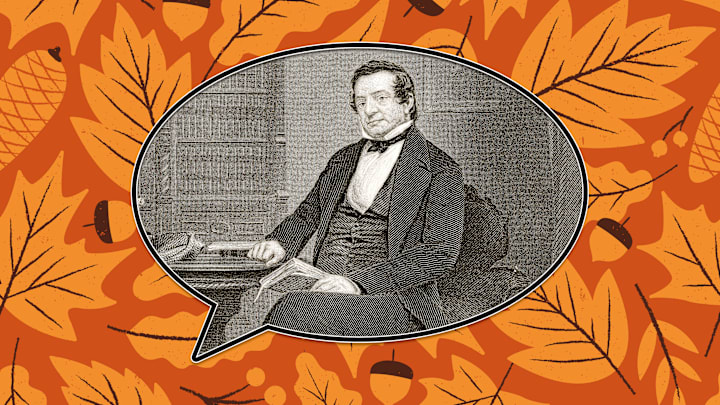There’s no better time of year than autumn to revisit two timeless and cherished tales of author Washington Irving. Both “The Legend of Sleepy Hollow” and “Rip Van Winkle” unfold during the harvest season in New York’s Hudson Valley, amid the season in which, as Irving puts it, “Nature wore that rich and golden livery which we always associate with the idea of abundance.”
Writing in the early 1800s, Washington Irving was one of America’s first writers to achieve truly mass appeal, contributing to a unique literary voice coming from the young, revolutionary republic that garnered recognition on the world stage. In these two stories, which are among Irving’s best-known today, the author also encapsulated an idyllic image of Dutch country life along the Hudson, which was already waning in the post-independence period.
Another treasure to be found within these pages: A delightful set of words and phrases that add color and texture to these early years of the American nation, not to mention the timeless joys of the season. Try spicing up your fall with a few of these rustic charmers.
1. Roister (or Royster)
Roister, a synonym for carouse, means “to engage in noisy, drunken, riotous behavior.” By extension, this verb can also mean to walk with a swaying motion. One acting in such a state, as you might find at seasonal festivities, can be labeled a roisterer. (Irving uses the derivatives roystering and roysterers in these stories; in “Rip van Winkle,” for example, he writes that “He now suspected that the grave roysterers of the mountains had put a trick upon him[.]”)
2. Higgledy-piggledy
Higgledy-piggledy is an adjective describing a state of confusion or disorder, usually in regard to objects. While of uncertain origin, other nonsense rhyme couplets serve similar roles (think of the slightly more common “willy-nilly”).
3. Madcap
Madcap means “impulsive, hasty, or reckless,” used especially to describe adventurous activities or personages. As Irving wrote in “The Legend of Sleepy Hollow,” “when any madcap prank or rustic brawl occurred in the vicinity, always shook their heads, and warranted Brom Bones was at the bottom of it.” The adjective, attested as far back as the 1580s in England, derives from the sense of cap as “head,” so it’s literally “crazy in the head.”
4. Gambol
A gambol is a playful walk or frolic, and can be used as a verb as well as a noun. Just such a jovial meander started Rip Van Winkle on his unforgettable encounter in the Catskills. For a particularly heedless frolic, combine with the above adjective, as Irving did in his The Sketch Book of Geoffrey Crayon, Gent.
5. Galligaskins
Galligaskins refers to large, loose-fitting breeches fashionable in the 16th and 17th centuries. This term was used by Irving to describe the attire Rip Van Winkle’s son wears in the story (“equipped in a pair of his father’s cast-off galligaskins”). Whatever these pantaloons are, they sound as comfy as they are fun to pronounce.
6. Harangue
A harangue is an impassioned, disputatious public speech or rant. Additionally, haranguing can connote forceful admonitions or drawn-out tirades. To be avoided at all costs at your next county-wide social gathering.
7. Rantipole
Rantipole is a term for an unruly, rude person (Irving describes Brom Van Brunt as a “rantipole hero”). Notably, the roots of the term seem to be similar to madcap in that poll or pole was once a term for one’s head, and ranty used to describe a directionless nature.
8. Mynheer
Mynheer was a salutation of reverence for a Dutchman (and by extension, the Dutch American inhabitants of the Hudson Valley). It was equivalent to “Sir” in English, and perfectly applicable when raising a glass to one such gentleman.
9. Akimbo
Akimbo probably derives from Middle English in kenebowe, meaning “sharply bowed.” This state describes a posture of hand placed on hip with elbow turned outward; Irving writes of a character as standing before Rip Van Winkle “with one arm akimbo, the other resting on his cane.” Given the prevalence of the stance (particularly during a particularly long haranguing), it’s a wonder this apt term isn't used more often.
10. Rubicund
Rubicund is a synonym for ruddy, describing a reddish complexion. In “Rip Van Winkle,” Irving thus describes “a portrait of His Majesty George the Third,” but today the term could be just as readily applied to color that rises with spirits.
11. Gallows Air
This phrase, used to describe the forlorn appearance of Rip Van Winkle’s canine companion, appears to be of Irving’s own making: “The moment Wolf entered the house, his crest fell, his tail drooped to the ground, or curled between his legs, he sneaked about with a gallows air, casting many a sidelong glance at Dame Van Winkle, and at the least flourish of a broomstick or ladle, he would fly to the door with yelping precipitation.”
A version of this story ran in 2015; it has been updated for 2023.
Are you a logophile? Do you want to learn unusual words and old-timey slang to make conversation more interesting, or discover fascinating tidbits about the origins of everyday phrases? Then get our new book, The Curious Compendium of Wonderful Words: A Miscellany of Obscure Terms, Bizarre Phrases, & Surprising Etymologies, out now! You can pick up your copy on Amazon, Barnes & Noble, Books-A-Million, or Bookshop.org.
